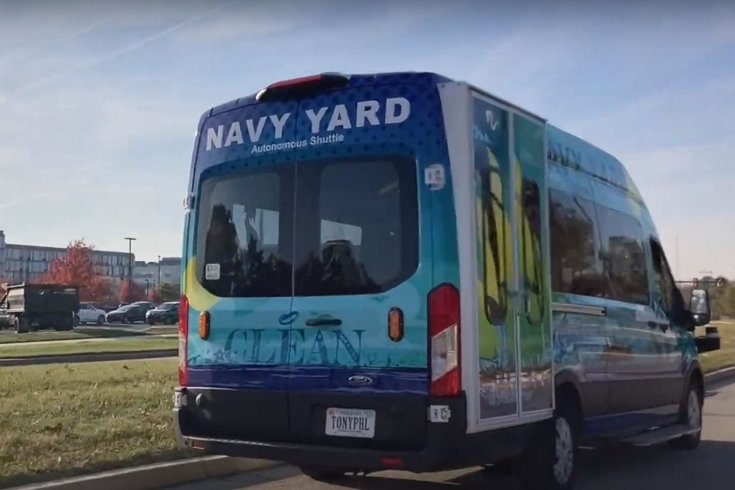
February 26, 2024
 Source/PennDOT
Source/PennDOT
The Navy Yard has a new self-driving shuttle service that will operate weekdays from 10 a.m. to 2 p.m. It is Pennsylvania's first autonomous vehicle shuttle.
The first self-driving shuttle service in Pennsylvania will begin operating Tuesday at the Navy Yard, offering a four-stop loop for visitors and workers at the South Philly business hub.
The nine-seat, electric-powered van has been tested for more than a year to pave the way for riders. A human operator will remain behind the wheel to override the self-driving technology if necessary, adding a layer of safety.
The van, which is wheelchair-accessible, initially will operate Mondays to Fridays from 10 a.m. to 2 p.m. The four stops on its nearly 2-mile loop will be at Rouse Boulevard and Intrepid Avenue at the Courtyard by Marriott; Broad Street and Crescent Drive at the restaurant Gatehouse; 15th Street and Kitty Hawk Avenue at DiNic's Pork & Beef; and 15th Street and Flagship Avenue at the URBN campus and shop.
"It's really to connect to the amenities and make it a little easier for people down here to cross campus," said Jacob Dillon, a spokesperson for the Philadelphia Industrial Development Corp., one of the partners behind the new shuttle.
The shuttle service will move ahead in small steps to allow for careful analysis of the program and how the public responds to it. The schedule will be posted and updated regularly on the Navy Yard Transit app.
The project is viewed as an important step forward in Pennsylvania's effort to build a safe, reliable industry for self-driving vehicles, some of which have encountered setbacks since they've been deployed in other cities.
The Navy Yard was chosen as a test site because of its growing economic footprint and relative detachment from the rest of the city's traffic grid. That created the opportunity to address a need and experiment with autonomous vehicle technology in a more controlled environment.
The former naval base, now home to more than 150 businesses and 15,000 employees, remains largely inaccessible to people without cars. There's an existing Navy Yard shuttle that operates routes out of Center City (from 10th and Filbert streets) and from SEPTA's NRG Station about a mile away. SEPTA also is considering creating a Navy Yard bus line. For now, with limited bike infrastructure in the area, many people are dependent on cars to get there efficiently.
"As the campus grows, we hope to offer more services like this to have less reliance on single-occupancy vehicles," Dillon said.
The self-driving shuttle program is a collaboration between PIDC, PennDOT, Drexel University, Perrone Robotics, AECOM and the Delaware Valley Regional Planning Commission.
The next phase of the project involves tests to take the self-driving van between the Navy Yard and NRG Station. A timeline for that route to become available hasn't been determined.
"Once we get internal ridership on it with people from the campus, we're going to solicit feedback through a survey to keep on honing in on the tech," Dillon said. "The end goal is to connect to NRG station to close that last-mile connector."
The loop that debuts this week is about a 12-minute trip, meaning it will run about six times every hour. The tests that were conducted over the last year proved that the technology could handle safely navigating the Navy Yard campus.
"Between stop lights, pedestrians and construction, it's been responsive and very promising," Dillon said.
Perrone Robotics, based in Virginia, retrofitted a 2023 Ford e-Transit van to enable speedier implementation of the program under current state and federal guidelines. Many automated shuttles require approval from the National Highway Traffic Safety Administration, but the use of a retrofit allowed the state to simplify the rollout, PennDOT said.
Although Pennsylvania has been among the nation's leaders in self-driving technology, the state has taken a more cautious approach to deployment of autonomous vehicles. In late 2022, former Gov. Tom Wolf signed a bill allowing driverless cars to operate on public roads without humans inside them. To date, the law mostly has impacted the testing of driverless cars, but Gov. Josh Shapiro has said he wants Pennsylvania to become a national leader in deployment of the technology.
In recent years, San Francisco, Phoenix and Austin have permitted fully driverless taxi services to operate on their streets. The robotaxi industry, led by Alphabet's Waymo and General Motors' Cruise, has faced a number of challenges due to high-profile incidents and complaints about driverless vehicles disrupting emergency services like fire trucks.
California indefinitely suspended Cruise's license last October after a crash involving a jaywalking pedestrian in San Francisco. The woman was struck by a human-driven vehicle before a robotaxi in an adjacent lane "braked aggressively" and trapped her under the car, causing serious injuries. The crash renewed questions about the situational capabilities of self-driving technology — particularly when human error is the initial source of failure — and prompted increased scrutiny from federal regulators.
PennDOT said the Navy Yard shuttle service will evolve to accommodate ongoing construction in the area. Major development plans are projected there in the years ahead, including a $6 billion project to create a residential community and retail center.
Dillon described the shuttle service as a testament to the history of the Navy Yard.
"To have this technology operating down here really highlights that we're a campus of innovation," he said. "This was the first place of naval aviation and modern ship building, and now there's companies down here coming up with cures for cancer. The AV shuttle is just another example of that tradition."